|
|
|
Sort Order |
|
|
|
Items / Page
|
|
|
|
|
|
|
| Srl | Item |
| 1 |
ID:
128435
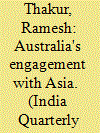

|
|
|
|
|
| Publication |
2013.
|
| Summary/Abstract |
The ebb and flow of coping with Australia's identity dilemma as a European settler society located on the geographical edge of Asia leads to bouts of agonising, excitement and temporising. This has been given particular cogency with the power shift underway from the trans-Atlantic to the Asia-Pacific. The 2012 White Paper set 25 national objectives to be met by 2025, with targets ranging from improving trade links and increasing scholarships to teaching priority Asian languages. But in this transactional embrace of Asia that highlights economic and trade links, gaps might open up between ambition and delivery, especially amidst continuing evidence of insensitivity to how Asians forge lasting relationships. Ties with China are dominated by trade but security concerns remain. Relations with India should improve with the removal of the nuclear issue as an irritant and growing trade and tourist numbers. Japan remains an important trade and diplomatic partner. And geography and demography ensure that Indonesia is no less important to Australia than Asia's big three.
|
|
|
|
|
|
|
|
|
|
|
|
|
|
|
|
| 2 |
ID:
128444
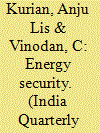

|
|
|
|
|
| Publication |
2013.
|
| Summary/Abstract |
Energy security is considered to be a universal issue in the twenty-first century. It denotes the right to use reliable sources of energy at competitive prices produced in an environmentally sustainable and safe means as well as the security of supply and demand. The strategic significance of energy security has been stirred by the political and economic events since 1970. The purpose of energy security is to guarantee adequate, reliable supplies of energy at reasonable prices in ways that do not endanger major national values and objectives. Energy security has different dimensions that vary from economic, environmental, social, foreign and technological progress which differ from country to country, and also from one period to another. To meet the growing aspirations of the people and the economies of South Asia, countries are under massive social and political strain to secure reliable, sustainable and reasonably priced energy supplies to meet the escalating demand for commercial energy. Energy security is thus no longer merely a catchword but an irrefutable reality for vital economic development throughout South Asia. And energy security will remain a high priority issue all over the world and the duty of ensuring energy security to the people and the state is not only confined to national governments but also to regional and international regime. This article analyses the emerging trends of energy security through the most debated contemporary issues such as climate change, sustainable development and globalisation.
|
|
|
|
|
|
|
|
|
|
|
|
|
|
|
|
| 3 |
ID:
128436
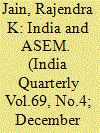

|
|
|
|
|
| Publication |
2013.
|
| Summary/Abstract |
Indian membership of the Asia-Europe Meeting (ASEM) represents an interesting case study of identity and exclusion of a major Asian country from a key interregional forum. Examining the vicissitudes of India's decade-long quest for membership of ASEM since its inception, this article highlights how the exclusionary definition of Asia in Western and Asian discourses kept India out of regional entities. It discusses the arguments of Asian and Western critics of Indian membership in ASEM and concludes that India's purposeful and constructive Look East Policy since the early 1990s and membership of the East Asian Summit facilitated Indian membership of ASEM.
|
|
|
|
|
|
|
|
|
|
|
|
|
|
|
|
| 4 |
ID:
128434
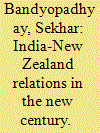

|
|
|
|
|
| Publication |
2013.
|
| Summary/Abstract |
India-New Zealand relations, which could be historically dated back to the days of the British Empire, lacked until recently in substance and were rocked by several irritants, the most important of which were the divergent views on the issue of nuclear non-proliferation. However, in last one decade or so there have been some remarkable developments in this bilateral relation, as the security interests of the two nations have converged, volume of trade increased, educational ties grew stronger and people-to-people contacts improved significantly. While there still remain some challenges, as negotiations for a Free Trade Agreement have taken longer time than expected, there are also immense possibilities. This essay looks critically at those challenges and possibilities in the relationship between two countries, which on the one hand share some historic common grounds, but are also set apart by geography as well as numerous systemic dissimilarities.
|
|
|
|
|
|
|
|
|
|
|
|
|
|
|
|
| 5 |
ID:
128437
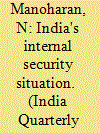

|
|
|
|
|
| Publication |
2013.
|
| Summary/Abstract |
Challenges to internal security of India are numerous. The extent and scope of threats are complex, varied and vast. No other country in the world confronts so many threats, with so much intensity, at the same time. Overall, more than 50 per cent of India is said to be affected by one or the other of these threats, which are not just 'law and order' problems. They have increasing external dimension falsifying conventional wisdom that internal security threats are caused mainly by internal sources. They threaten the body politic like a 'cancer'. The state of poor internal security situation is not because of India's unfavourable strategic environment but also due to weak internal security mechanism, especially its criminal justice system. In this context, the article argues that if appropriate actions are not taken, the threats may result in the gradual degradation of the Indian State. It suggests renewed set of policies and mechanisms in political, economic, socio-cultural, military and diplomatic arena.
|
|
|
|
|
|
|
|
|
|
|
|
|
|
|
|
|
|
|
|
|